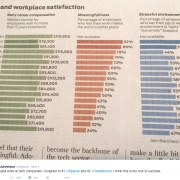Is This the End of Progressive America?
Over the past several decades, the progressive Left has successfully fulfilled Antonio Gramsci’s famed admonition of a “long march through the institutions”. In almost every Western country, its adherents now dominate the education system, media, cultural institutions, and financial behemoths.
But what do they have to show for it? Not as much as they might have expected. Rather than a Bolshevik-style assumption of power, there’s every chance this institutional triumph will not produce an enduring political victory, let alone substantially change public opinion.
Even before Biden’s botched Build Back Better initiative, American progressives faced opposition to their wildly impractical claims about achieving “zero Covid” and “zero emissions”, confronting “systemic racism” by defunding the police, regulating speech, and redefining two biological sexes into a multiplicity.
Increasingly, the “march” has started to falter. Like the French generals in 1940 who thought they could defeat the Germans by perfecting World War One tactics, the progressive establishment has built its own impressive Maginot Line which may be difficult to breach, but can still be flanked.
That is not to deny the progressives’ limited successes. It has certainly developed a remarkable ability to besmirch even the most respected institutions, including the US military. But that is where its achievements stop.
While the Pentagon’s top brass focused on “domestic terrorists” and a progressive social agenda, it calamitously bungled its withdrawal from Afghanistan and appears utterly unprepared for Chinese or Russian competitors. And the effect of this progressive march is plain to see: the percentage of Americans who feel “a great deal of trust and confidence in the military” has dropped in just three years to 45% from 70%.
This decline in trust in major institutions, so evident in America, is also rife across Europe and Australia. In Europe, for example, young people express less pride in their cultural and religious heritage, and are almost three times as likely as their elders to believe that democracy is failing.
The great paradox of progressivism is that nowhere are its shortcomings more evident than in its geographic heartland: the dense urban centre. Conventional wisdom has dictated that America’s high-tech economic future will be shaped in dense urban areas, where superstar companies stand the best chance of recruiting superstar employees.
But while the upper crust of the labour force continue to head to the dense urban cores, on the ground people are moving in the other direction. Across the high-income world, not only in America but Europe as well, the vast preponderance of growth has taken place in suburbs and exurbs. In the last decade over 90% of all US metropolitan population growth and 80% of job growth took place on the periphery. On the ground, then, the progressive dream is withering.
The pandemic has greatly enhanced these trends, with downtown neighbourhoods recovering far less quickly than suburban, exurban, and small towns. But even if these changes are not permanent, at least not entirely, city residents will still have to contend with another pitfall of the progressive agenda: rising crime. Twelve American cities have experienced record homicides this year; all are ruled by Democratic, often progressive, leaders, many of whom explain away crime and excused, even praised, the looting and mayhem caused by protestors in the summer of 2020.
Yet despite this visceral impact on urban neighbourhoods, it is in education that our new hegemony could have its most long-lasting impact. The West’s new educational mandarins, increasingly strident and increasingly influential, have no use for our liberal inheritance, which they consider little more than a screen for racists and misogynists.
Read the rest of this piece at UnHerd.
Joel Kotkin is the author of The Coming of Neo-Feudalism: A Warning to the Global Middle Class. He is the Roger Hobbs Presidential Fellow in Urban Futures at Chapman University and Executive Director for Urban Reform Institute. Learn more at joelkotkin.com and follow him on Twitter @joelkotkin.
Homepage photo: MCAS Cherry Point, via Flickr under CC 2.0 License.








 Russ Loar, used under CC 2.0 License
Russ Loar, used under CC 2.0 License Chris Devers, used under CC 2.0 License
Chris Devers, used under CC 2.0 License